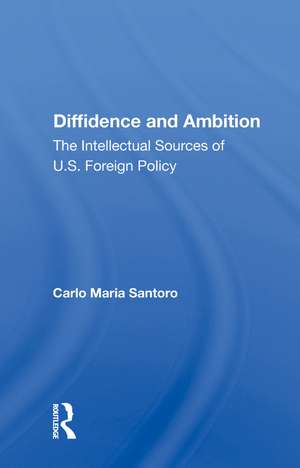Diffidence And Ambition: The Intellectual Sources Of U.s. Foreign Policy
Autor Carlo Maria Santoroen Limba Engleză Hardback – 7 iun 2019
Preț: 764.20 lei
Preț vechi: 1027.40 lei
-26% Nou
Puncte Express: 1146
Preț estimativ în valută:
146.24€ • 151.82$ • 121.95£
146.24€ • 151.82$ • 121.95£
Carte tipărită la comandă
Livrare economică 22 martie-05 aprilie
Preluare comenzi: 021 569.72.76
Specificații
ISBN-13: 9780367012960
ISBN-10: 0367012960
Pagini: 332
Dimensiuni: 146 x 229 mm
Greutate: 0.45 kg
Ediția:1
Editura: Taylor & Francis
Colecția Routledge
Locul publicării:Oxford, United Kingdom
ISBN-10: 0367012960
Pagini: 332
Dimensiuni: 146 x 229 mm
Greutate: 0.45 kg
Ediția:1
Editura: Taylor & Francis
Colecția Routledge
Locul publicării:Oxford, United Kingdom
Cuprins
Introduction -- The American Theorem -- The International Context and the Analytical Categories -- Interdependence and National Security: The Two Pillars of U.S. Foreign Policy -- The Case Study: The Council on Foreign Relations -- Coexistence with Nazi Europe: One Scenario -- The Grand Area and Self-sufficiency: Another Scenario -- Anglo-American Relations and the Atlantic System -- The Expansion of the Western Hemisphere -- Defending the Continent -- Greenland and Iceland -- The War and Peace Studies and the Concept of National Security -- Conclusion: The Pearl and the Oyster
Descriere
In this significant study of U.S. foreign policy, Carlo Maria Santoro traces the origin and implementation of the key principles that guided U.S. actions in the postwar world. The author argues that the period of U.S. neutrality at the beginning of World War II was crucial in developing the concepts of interdependence and national security that remain integral to U.S. foreign policy today. The heart of the book is Santoro's detailed case study of the Council on Foreign Relations' War and Peace Studies project, which was a major source of the theories that have shaped policy-making. Informed by the author's European perspective and sweeping grasp of the literature, the book presents a rich and complex analysis of competing schools of thought and methodological approaches to the making of U.S. foreign policy.
